
The Band is the second studio album by the Canadian-American rock band the Band, released on September 22, 1969. It is also known as The Brown Album. According to Rob Bowman's liner notes for the 2000 reissue, The Band has been viewed as a concept album, with the songs focusing on people, places and traditions associated with an older version of Americana. Thus, the songs on this album draw on historic themes for "The Night They Drove Old Dixie Down", "King Harvest " and "Jawbone".

Kick Out the Jams is the debut album by American rock band MC5. It was released in February 1969, through Elektra Records. It was recorded live at Detroit's Grande Ballroom over two nights, Devil's Night and Halloween, 1968.

Let It Bleed is a studio album by the English rock band the Rolling Stones, released on 28 November 1969 by London Records in the United States and on 5 December 1969 by Decca Records in the United Kingdom. Released during the band's 1969 American Tour, it is the follow-up to Beggars Banquet (1968), and like that album is a return to the group's more blues-oriented approach that was prominent in the pre-Aftermath (1966) period of their career. Additional sounds on the album draw influence from gospel, country blues and country rock.

Sex Machine is a 1970 double album by James Brown. It showcases the playing of the original J.B.'s lineup featuring Bootsy and Catfish Collins, and includes an 11-minute rendition of the album's title song, different from the original recording of the title song which was released as a two-part single in 1970.

Live at the Regal is a 1965 live album by American blues guitarist and singer B.B. King. It was recorded on November 21, 1964, at the Regal Theater in Chicago. The album is widely heralded as one of the greatest blues albums ever recorded and was ranked at number 141 in Rolling Stone's 2003 edition of the 500 Greatest Albums of All Time list, before dropping to number 299 in a 2020 revision. In 2005, Live at the Regal was selected for permanent preservation in the National Recording Registry at the Library of Congress in the United States.

"Please, Please, Please" is a rhythm and blues song performed by James Brown and the Famous Flames. Written by Brown and Johnny Terry and released as a single on Federal Records in 1956, it reached No. 6 on the R&B charts. The group's debut recording and first chart hit, it has come to be recognized as their signature song.

"Papa's Got a Brand New Bag" is a song written and recorded by James Brown. Released as a two-part single in 1965, it was Brown's first song to reach the Billboard Hot 100 Top Ten, peaking at number eight, and was a number-one R&B hit, topping the charts for eight weeks. It won Brown his first Grammy Award, for Best Rhythm & Blues Recording.
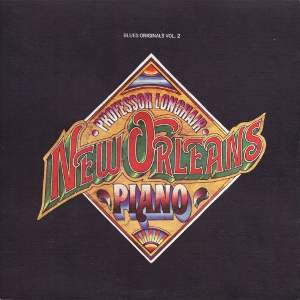
New Orleans Piano is a 1972 album by Professor Longhair. It consists of material recorded in 1949 and 1953, including tracks previously released by Atlantic Records.

The Famous Flames were an American rhythm and blues, soul vocal group founded in Toccoa, Georgia, in 1953 by Bobby Byrd. James Brown first began his career as a member of the Famous Flames, emerging as the lead singer by the time of their first appearance in a professional recording, "Please, Please, Please", in 1956.
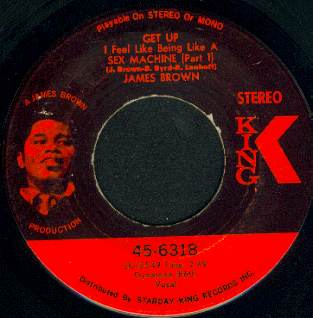
"Get Up Sex Machine" is a song recorded by James Brown with Bobby Byrd on backing vocals. Released as a two-part single in 1970, it was a no. 2 R&B hit and reached no. 15 on the Billboard Hot 100.
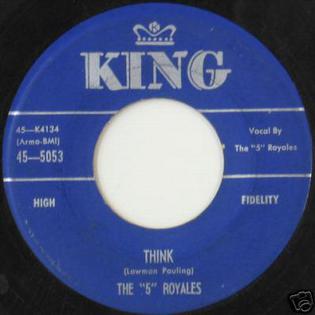
"Think" is a rhythm and blues song written by Lowman Pauling and originally recorded by his group The "5" Royales. Released as a single on King Records in 1957, it was a national hit and reached number nine on the U.S. R&B chart.
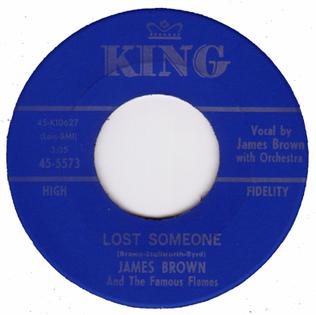
"Lost Someone" is a song recorded by James Brown in 1961. It was written by Brown and Famous Flames members Bobby Byrd and Baby Lloyd Stallworth. Like "Please, Please, Please" before it, the song's lyrics combine a lament for lost love with a plea for forgiveness. The single was a #2 R&B hit and reached #48 on the pop chart. According to Brown, "Lost Someone" is based on the chord changes of the Conway Twitty song "It's Only Make Believe". Although Brown's vocal group, The Famous Flames did not actually sing on this tune, two of them, Bobby Byrd, and "Baby Lloyd " Stallworth, co-wrote it with Brown, and Byrd plays organ on the record, making it, in effect, a James Brown/Famous Flames recording.

Guess Who is a studio album by B. B. King. It was released in 1972 by ABC Records.

"Out of Sight" is a funk song recorded by James Brown in 1964. A twelve-bar blues written by Brown under the pseudonym "Ted Wright", the stuttering, staccato dance rhythms and blasting horn section riffs of its instrumental arrangement were an important evolutionary step in the development of funk music.

Water Babies is a compilation album by American jazz trumpeter Miles Davis. It compiled music Davis recorded in studio sessions with his quintet in 1967 and 1968, including outtakes from his 1968 album Nefertiti and recordings that foreshadowed his direction on In a Silent Way (1969), while covering styles such as jazz fusion and post-bop. Water Babies was released by Columbia Records in 1976 after Davis had (temporarily) retired.
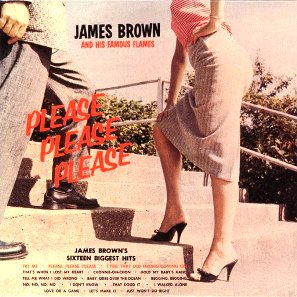
Please Please Please is the debut studio album by the Famous Flames under the billing "James Brown and His Famous Flames", featuring the first album of recordings during Brown's long career. It includes the group's first two hit singles, the title track and "Try Me", along with all the non-charting singles and b-sides he had recorded up to the time of the album's release. The album was reissued in 2003 by Polydor on a Japanese 24-bit remastered import CD packaged in a miniature LP sleeve.
"I'll Go Crazy" is a rhythm and blues song recorded by James Brown and The Famous Flames. Released as a single in 1960, it was Brown's fourth R&B hit, charting at #15. Brown and the Flames also performed it as the first song on their 1963 album Live at the Apollo.

Pure Dynamite! Live At The Royal is a 1964 live album by James Brown and The Famous Flames. Originally issued on King Records, it was the live follow-up to Brown's 1963 Live at the Apollo LP, and like that album, reached the Top 10 of the Billboard Pop album charts, peaking at #10. It was recorded live at the Royal Theatre in Baltimore, Maryland, a popular venue for R&B artists of the day. The album takes its title from Brown's most famous nickname at the time, "Mr. Dynamite".

The Parkerilla is a 1978 live double album by Graham Parker and The Rumour. It was recorded at Winter Gardens, Bournemouth, Manchester Opera House, Apollo Theatre, Oxford and The Palladium, New York City; and mixed at Rockfield Studios, Wales.
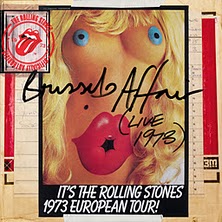
Brussels Affair is a live album by the Rolling Stones, released in 2011. It is compiled from two shows recorded in Brussels at the Forest National Arena on Wednesday 17 October 1973, during their European Tour. At the time, the band was unable to enter France, as guitarist Keith Richards had been temporarily banned from visiting the country after being charged with drug possession by a French court. The album was released exclusively as a digital download through Google Play Music on 18 October 2011 in the US and through the Rolling Stones Archive website for the rest of the world in both lossy MP3 and lossless FLAC format. The 2011 digital edition has been bootlegged on physical CD. On 29 August 2012, an official announcement was made, stating its physical release as a high-priced boxset. All three releases include a triple LP and double CD.



















